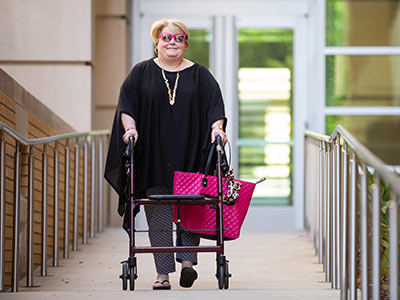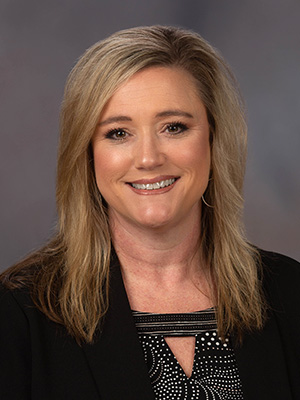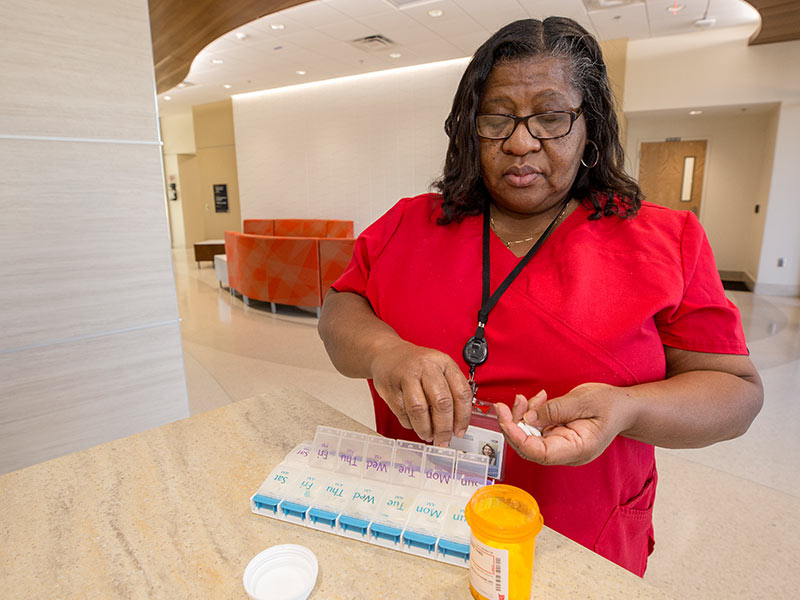Lifestyle management, chronic diseases go hand in hand

Tammy Dempsey lives with pain, but you might not know it by looking at her as she goes about her duties at the University of Mississippi Medical Center.
Director of Community Engagement and Service Learning in the Office of Academic Affairs, Dempsey will soon receive her doctor of education from the University of Mississippi. Even as she juggles school with a busy job, Dempsey knows she needs to take care of her health. She copes with lupus and arthritis.
After taking part in an Everyday Wellness program on chronic disease self-management, she learned how to recognize that her own physical needs are important. “A lot of things we learned were things that, being in a healthcare field, I might have already known,” Dempsey said. “It was time to remember how to apply it to myself.”
Everyday Wellness offers three lifestyle management programs that teach UMMC employees how to take charge of, and responsibility for, their good health. “The idea is to make changes that will fit into your life,” said Dr. Abigail Gamble, an assistant professor in the Department of Preventive Medicine. “It’s about developing skills needed to better manage your conditions.”
The three options:
- Chronic disease self-management program, or CDSMP, a six-week series for anyone with a chronic disease or disability, or a caregiver. “It teaches participants how to manage things in their lives related to their disease by designing their own program to handle symptoms,” said Brea Cole, manager of medically integrated wellness programs in Preventive Medicine.
Examples of chronic conditions include arthritis, diabetes, asthma or lung disease, heart disease, hypertension, chronic pain, depression and cancer.
- Diabetes prevention program, or DPP, a 12-month series for pre-diabetics or those who are at high risk for type 2 diabetes. It’s available to employees and family members who qualify. The goal is to prevent the onset of diabetes through weight loss achieved by increasing physical activity and improving diet.
- Diabetes empowerment education program, or DEEP, a six-week module that provides diabetics with tools to better manage and control their disease and to reduce the risk for complications.
The healthy lifestyle programs are offered mostly in the late afternoons, but lunch programs may be in the works for future cohorts.

Cole said it’s a real moment of truth for some employees who want to take part. At a recent screening, she said, “two people had a glucose level of over 400,” she said. “One of the women felt so bad that she started crying. I asked her to sit down so that we could measure her blood pressure and glucose.
“She knew she had diabetes. She wasn’t taking her medicine regularly,” Cole said. “I sent her to Dr. (Josie) Bidwell for help with her lifestyle choices.” Bidwell, a nurse practitioner and associate professor of nursing, operates UMMC’s new Lifestyle Medicine Clinic, which teaches patients how changing their lifestyle can help them live longer, healthier lives.
Each class enrolls a maximum 20 people, Cole said. “We want it to be small because it’s a group setting and very interactive.”
Key to lifestyle management programs, Cole said, is the support system and camaraderie they offer. “The program is about the group dynamics and people helping each other,” Cole said. “They really get attached to each other, and they’re sad when it’s over.”
That was the experience of Tammy Falls-Puryear, a Medical Center coding supervisor in physician surgical services.
“Being in a class with others dealing with chronic health conditions or caring for a loved one, even though they were different than mine, helped me not feel alone in my struggle,” said Falls-Puryear, who took part in the chronic disease self-management program that ended in March. “That helps with a person’s overall morale … to know that you are not alone in the challenges that you face.”
During the CDSMP, “we go over nutrition, physical activity, and their self-management toolbox that helps them meet their goals,” Cole said. If participants aren’t getting enough exercise, for example, they can set a goal of walking into the office from the stadium three mornings a week.
“They decide what the changes will be, and they continue to make them,” Cole said. “They might decide not to eat as much fast food, or to drink more water.”
Another example from a recent CDSMP: The husband of a UMMC employee had pulmonary disease and high blood pressure, Cole said. “He had quit riding his bike, but because he attended the class, he got his bike repaired and started riding again – five to 10 miles a day. That was his action plan. He did very well.
“You are accountable to your group. If you didn’t meet your goals, they might see it in your face, and you might see it in their face.”
The 12-month DPP involves measuring and weighing participants and recording their physical activity. “It’s an evidence-based program. Studies show that lifestyle changes and modest weight loss can prevent the onset of type 2 diabetes more than taking medicines,” Gamble said.

Although the CDSMP is not centered on diabetes, taking part in it helped her become more aware of how she truly feels about being diabetic, said Cora Champion, a project manager at The MIND Center. “I felt really old, and like there was not much I could do about my diabetes,” Champion said. “Because of the class, I know I can control it.”
Her blood sugar levels dropped. “I became more aware of foods that were not good for me, and the importance of not missing doses of my medications,” Champion said.
The first DPP begins May 8; for information, contact Cole at cbcole@umc.edu. The next CDSMP hasn’t yet been scheduled, but a new DEEP could begin in late summer if enough people are interested, Cole said. “By October, the first (DPP) cohort will be at the six-month mark, so it will meet less often,” Cole said.
Dempsey sometimes use a walker, but it’s not an excuse to avoid taking steps to improve her health – literally.
“I used to take the bus. When I was having trouble lifting the walker, I got a parking place on campus,” she said. Dempsey walks to the Learning Resources Center from parking near the Alumni House instead of being delivered to her building’s sidewalk. “I’m doing it to try to build up my energy,” she said.
“This class was just another reminder that if I don’t take care of myself, I can’t care for others.”


